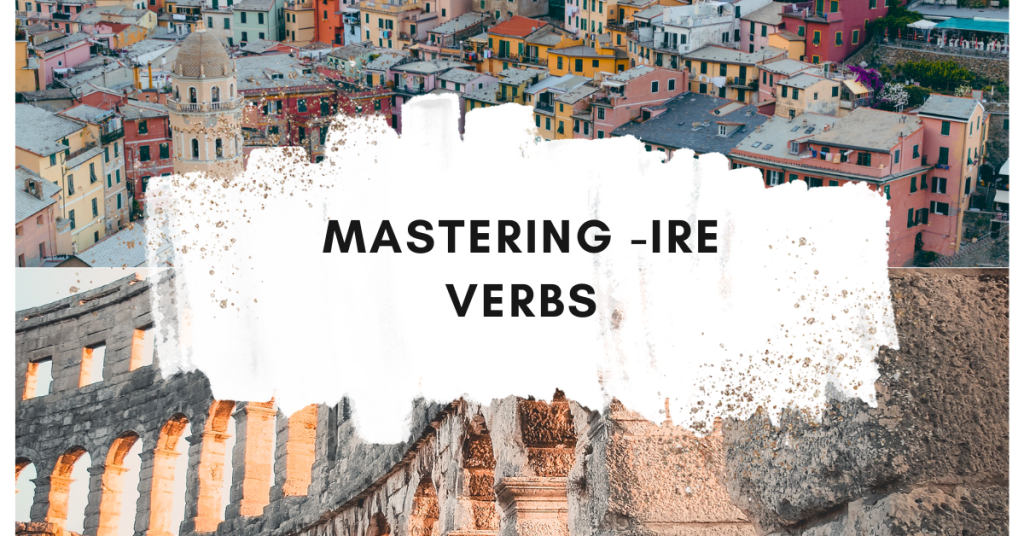The third group of Italian verbs are those that end in -ire. It’s the smallest group of verbs, and it has quite a few irregular ones. Let’s take a closer look at some of the most popular ire verbs in Italian and how to conjugate them.
Conjugate Ire Verbs In Italian – Regular Verbs
To conjugate ire Italian verbs:
- Remove the ire ending to get the stem of the word.
- Attach the appropriate ending.
Per esempio:
- Let’s take the verb “dormire.”
- If you remove the ire, you’re left with “dorm.”
- Now, attach the appropriate ending to the stem. If you want to say, “I sleep,” it would be “dormo.”
The ending will change based on the subject pronoun and the tense.
Presente
| Subject Pronoun | Ending |
| io | o |
| tu | i |
| lui/lei/Lei | e |
| noi | iamo |
| voi | ite |
| loro | ono |
Examples
For partire:
- Parto – I leave
- Parti – You leave
- Parte – He/She/It/formal leaves
- Partiamo – We leave
- Partite – You all leave
- Partono – They leave
Passato Prossimo
If we want to make the past participle of a regular ire verb, we simply remove the ire ending and attach ito or iti if it is plural. When using the passato prossimo form, keep in mind that you’ll also need to use the auxiliary verb essere or avere before the verb.
Per esempio:
- Essere: Sono partito – I left
- Avere: Ho dormito – I slept
Avere is used with transitive verbs, while essere is used with intransitive verbs.
Futuro
| Subject Pronoun | Ending |
| io | irò |
| tu | irai |
| lui/lei/Lei | irà |
| noi | iremo |
| voi | irete |
| loro | iranno |
Italian Ire Verbs List
Most-Used IRE Verbs in Italian
Venire: To come; arrive; to come from; to turn out; to come up; to cost; to send for or call
- Vieni a trovarci – Come and see us!
- Non sono ancora venuto – They haven’t arrived yet.
Dire: To say; to tell; to mean; to recite; to admit; to think
- Come si dice in spagnolo? – How do you say it in Spanish?
- Mi ha detto tutto – She told me everything.
Sentire: To feel (physical and emotional); to taste; to hear or listen to
- Sento dolore – I feel pain
- Sento dei passi – I hear footsteps
Uscire: To go out or leave; to come out; to be released
- Sono uscita ieri – I went out yesterday
- Uscira da – To go out
Seguire: To follow; to attend
- Seguo una dieta – I’m on a diet
- Seguire un corso – To follow a course
Partire: To leave; to start
- Quando parti? – When do you leave?
- La macchina non parte – The car isn’t starting
Salire: To go or come up; to get on or in; to rise
- Salo le scale – I’m going up the stairs
- Salire sul treno – To get on the train
Colpire: To hit or strike; to affect
- È state colpita – He was hit
- Sono rimasto colpito – I was shocked
Offrire: To offer; to bid
- Offro io – It’s on me!
- Mi hanno offerto un passaggio – They offered me a ride (lift)
Dormire: To sleep; to be asleep
- Vieni a dormire? – Are you going to bed?
- Sto dormendo – I’m sleeping
Riuscire: To succeed; to be able to; to prove to be
- Riuscire nella vita – To succeed in life
- Non riesco a farlo – I cannot do it
Aprire: To open; to turn on
- Apriamo la finestra – Let’s open the window
- Non riesco ad aprire un file – I can’t open a file
Capire: To understand
- Non capisco – I don’t understand
- Si capisce! – Certainly or of course
Vestire: To dress; to wear
- Vestire di nero – To wear black
- Vestirsi elegantemente – To dress oneself smartly
Morire: To die (literally and figuratively); to die out or fade
- Morire di fame – To die of hunger
- Morire di paura – To be scared to death
Divertire: To have fun or amuse
- Mi ha divertito molto – I was very amused
- È stato divertente – It was fun
Agire: To act; to function
- Bisogna agire – You have to act
- Ha agito male – She behaved badly
Scoprire: To discover or find out; to unveil
- Ho scoperto la verità – I found out the truth
- Scoprire che – To find out that…
Servire: To serve
- Ho servito il caffè – I served coffee
- A che cosa serve? – What is it used for?
Costruire: To build or construct
- Costruiremo una nuova casa – We are going to build a new house
- Come lo costruisci? – How do you build it?
Differire: To defer or postpone
- Differiamo di un mese – We defer for a month
- Differisco un viaggio – I postpone the trip
Riempire: To fill up
- Hai riempito il termos di caffè? – Did you fill the thermos with coffee?
- Riempirsi le tasche – To fill one’s pockets
Apparire: To appear; to seem
- Appare che – It appears that…
- Apparire chiaro – It seems clear
Aderire: To adhere to or fit
- Aderire a un partito – To join a party
- I pezzi aderiscono – The pieces fit together
Suggerire: To suggest
- Lei cosa suggerisce? – What does she suggest?
- Suggerisci di partire? – Do you suggest we leave?
Inserire: To insert; to enclose
- Inserire la spina della radio – To plug in the radio
- Inserire un annuncio sul giornale – To place an ad in the newspaper
Consentire: To agree or consent
- Non me lo consente – It won’t let me
- Non dobbiamo più consentire – We must no longer allow it
Favorire: To favor; to encourage; to support; please
- Mi favoriresti il pane? Would you pass me the bread?
- Ha favorito il lavoro del figlio. – He supported his son’s work
Unire: To join or unite; to combine; to mix
- Abbiamo unito le nostre forze – We united our strengths
- Unire lo zucchero – Add the sugar
Impedire: To obstruct; to hamper; to hinder
- Impedire il trasporto di armi – To obstruct the transfer of weapons
- Che ti impedisce di farlo? – What’s stopping you from doing it?
Riferire: To report or tell
- Come ha riferito il quotidiano – As the newspaper reported
- Riferire sull’emergenza – Report on the emergency
Fuggire: To escape
- È fuggito di prigione – He escaped from prison
- Noi obbligati a fuggire dal fuoco – We are forced to flee from the fire
Irregular Ire Verbs Italian
IRE verbs in Italian comprise the smallest group of verbs among the ERE, ARE and IRE families. However, there are also Ire isc verbs Italian for some irregular verbs. There are also very popular irregular IRE verbs that don’t follow the “isc” conjugation, such as:
- Venire, which conjugates to vengo
Then there are also verbs that use “ISC,” such as:
- Preferire: to prefer:
- Io preferisco
- Tu preferisci
- Lui/leu preferisce
- Noi preferiamo
- Voi preferite
- Loro preferiscono
- So many others
- Capire
- Pulire
- Costruire
- Spedire
- Finire
Irregular IRE verbs in Italian are important to memorize because they’re easy to overlook and can be mistaken for a regular verb. With a little time and effort, you’ll get used to seeing these verbs and will learn to conjugate them properly.

